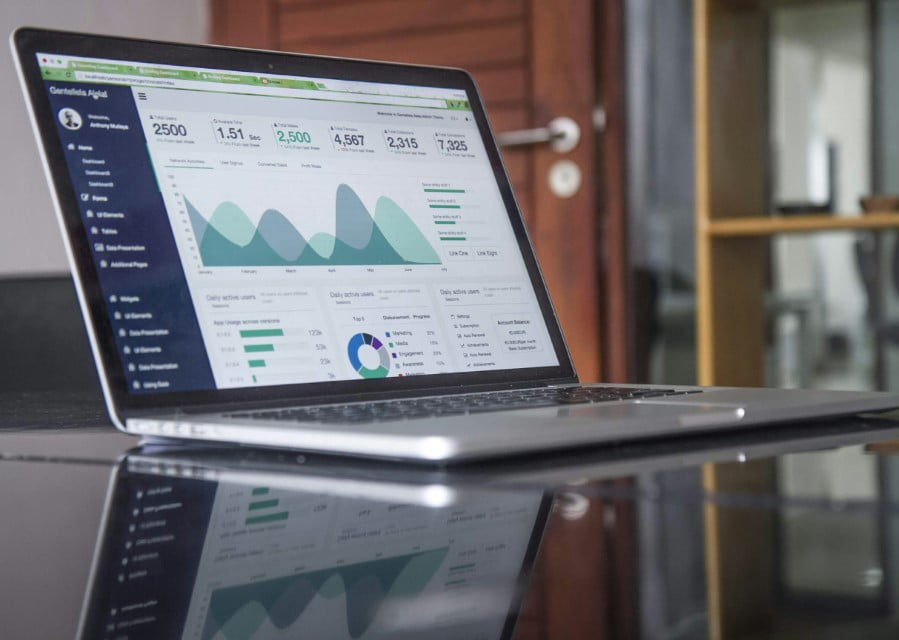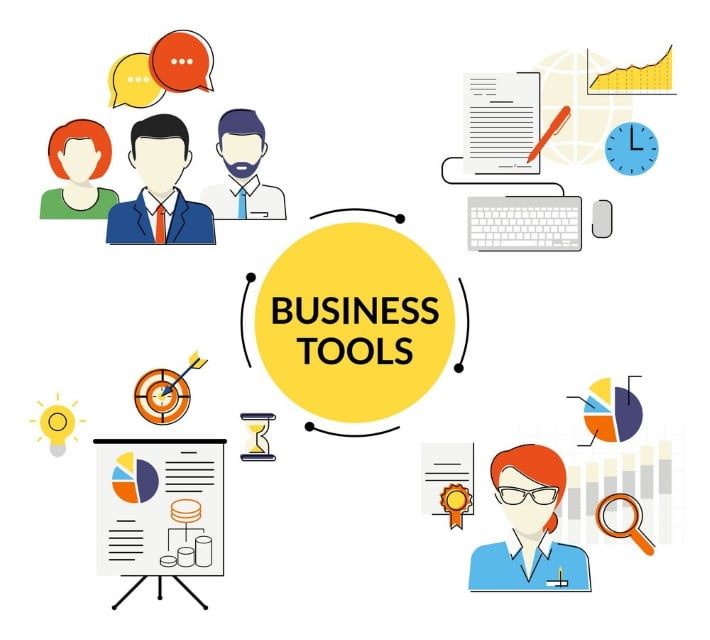There are a lot of big tasks that come with running a business. You need to keep your books up to date and send out invoices, among other things. To keep your business going, you need the right tools. Otherwise, you might drop what you’re doing.
What accounting tools should you always have on hand to ensure everything runs smoothly?
Tools for businesses to use for accounting
There are many business financial tools out there. You need to find the best small business financial tools for you. These are six common accounting tools:
Accounting Tools
Software for billing
Credit card for business
One or more business bank accounts
The financial calendar
Keeping books
Table of Contents
1. Accounting Tools
Please do not worry if you are not an accountant. You can keep track of your daily activities with accounting software, which is simple to use. When you use most financial tools, you can:
Keep track of your income, spending, debts, and investments.
Figure out the account totals.
Digital copies of papers and notes should be kept.
Balance the bank accounts.
Make reports and cash records

If you’re a business owner, look for accounting software that works with salary software. Integration lets you do salary and send the data directly to your books, so you don’t have to write it by hand.
One of the good things about accounting software is that it usually lets users pay and keep track of 1099 workers. At the end of the year, you can print out Forms 1099 and 1096. First, you need to get workers and sellers to fill out Form W-9 and send it back to you. Then, before paying freelancers, put their Form W-9 information into the software. This will cause the software to make Forms 1099.
You can send Forms 1099 and 1096 to the IRS and states that are part of the Combined Federal/State Filing Program with some tools. If your accounting program doesn’t let you do that, though, you’ll have to send hard copies.
Does your company move around a lot? Anywhere, at any time, you should be able to log in to your cloud accounting software account. Adding to your books is easy from anywhere with an internet link, so don’t forget to write down anything.
If a business does a lot of the same transactions, it might also want to pick accounting software that uses machine learning to quickly import and sort transactions.
2. Software for billing
Sometimes, software for billing is built right into software for budgeting. If the accounting software you use doesn’t have a choice for billing, you might want to look for software that does (or get new accounting software that does).
Using software for billing helps you set up a quick and easy way to get paid by customers. One good thing about a system that works better and more efficiently is that you might get paid faster.
Also, software for sending bills lets you make a standard design for all of them. You don’t have to make a new invoice by hand every time, so you can quickly make and send an invoice.
Once you’ve sent bills, the program should let you keep track of which customers paid and which ones you sent invoices to.
3. Credit cards for business
When your business accounts are different from your accounts, it’s easier to keep your books. Credit cards for each account are kept separate.
When you get a business credit card, you can keep good records of your finances and file your taxes correctly. It’s also easier to keep track of tax-deductible costs when personal purchases aren’t shown on your business credit card bills. In the end, you can’t subtract personal costs from your taxes. You have to show the IRS that all of your business costs are things you bought for your business.
Business credit cards help many business owners finance their companies, and they also make it easier to keep track of separate costs. Why? Some business credit cards have extra perks, like higher spending limits than personal credit cards.
Read all of the fine print on a credit card before you sign up for one. It takes longer to get a credit card from some companies than from others. There are also times when you might need a personal promise.
4. Accounts for business banks
Just like with credit cards, you need different bank accounts to keep track of work and personal transactions.
A business bank account has many benefits, such as:
Keeping cash records in order
Correct taxes and deductions
Being able to take credit card payments
Having more than one person sign a business account
Customers and suppliers will see that you look professional.

Having a business bank account can also help you build a relationship with the bank that can help you get a loan for your business.
Remember that business bank accounts cost money. But you can write off the bank fees on your taxes.
5. A plan for money
It’s simple to overlook something when you’re busy running your business. Financial due dates may not get met on time because of meetings, reviews, and other things. Don’t forget about important financial jobs and due times. If you need to remember important times, use a business calendar.
A desk calendar or another hard copy calendar can be used. Just make sure you see it every day while getting work done. You could also make a different web calendar that works with your phone or email. You can set most online calendars to remind you of tasks that are coming up.
Most importantly, don’t forget to check your calendar often for things like
Due dates from the IRS
Days to put together your financials
Getting together with your lawyer or financial expert
6. Bookkeeper
You’re not likely an accountant since you run a business. That’s why you might want to get help from an attorney. If you need help with the more complicated parts of budgeting, you can talk to a trained accountant. So, you can pay more attention to your work.
One of the best ways to use accounting to help you make business decisions is to hire an accountant. A CPA can look at your books and tell you which financial choices are working and which ones are not.
An accountant can also help you order your books, file and pay your taxes, and give you advice on money matters. At the end of the year, your accountant can also help you look over your spending plan, make a new one, and avoid making the most common planning mistakes in business.
Here are 5 tools that small businesses can use for accounting
1. Freshbooks
Freshbooks is a great way for small businesses to keep track of their finances. It works well if your business is based on subscriptions because it lets you send out recurring bills immediately. In terms of keeping track of money, it does everything you’d expect from a banking tool. For example, it tells you exactly where and when a client opened an invoice.
Not only is the platform easy to use but there is also a mobile app. Freshbooks is a good place to start with financial tools for small businesses. It starts at just $6 a month and lets you improve if you need to.
Pros:
Dashboard that is easy to use Mobile app
Low-cost
Cons:
Not specifically designed to work with other apps
2. Quickbooks Online by Intuit
One of the most well-known and used bookkeeping programs on the market is Without a doubt Intuit Quickbooks. It does all the main things you probably want from accounting software: keep track of payments, send bills, organize spending, do your taxes, and so on.
It also works with PayPal, Shopify, and Square, and customer service is available 24 hours a day, 7 days a week. Intuit Quickbooks starts at $8 a month, and some upgrades let you track goods and time, as well as make full payments.
Pros:
In Style
Works with different tools
Cons:
Not a free version
It could have more tools than you need.
3. Poor Pabbly
Pabbly is a business model builder for medium-sized businesses that work on subscription and membership-based plans. The software gives you information about your monthly payments, sales, current users, and other things.
Pabbly also lets you automate tasks like customer service, routines, and creating invoices. This can help you set up methods for the business tasks you often do. Setting up processes that work is the key to growth, as any business owner who has done it knows.

It’s also a great tool for businesses that do business all over the world. It’s a smart accounting tool for businesses that use a membership model because it works with more than 23 global currencies and PayPal and Stripe. It costs $9 a month to start.
Pros:
Great for businesses that use subscriptions
Integration of PayPal and Stripe
Set up of systems automatically
Cons:
Better for medium-sized businesses than small ones
It could have more tools than you need.
Related Post:10 Best Tips for Hiring Employees for a Small Business
4. Wave
Wave is a free accounting tool that will help you get started. It works best for freelancers and very small businesses. Wave is a great service, don’t be fooled by the price tag that you can’t see.
It is built into the program to handle transactions and invoices. Plus, Wave lets you sync up more than one device, so your books are always up to date, no matter where you are.
To be fair, you will have to pay a fee for some activities, and you can’t get more services. You’ll have to go somewhere else when you need more powerful accounting tools.
Pros:
Free records, billing, and accounting
Accounting tool for businesses that have won awards
Cons:
Most likely won’t meet your goals in the long run
Best for small businesses and sole proprietorships with few workers
5. Kashoo
Kashoo is a small business financial tool that you can use if you don’t want to look at different plans from the same service. In exchange for $16.65 a month, you can get a single plan that covers everything a small business needs.
The best thing about Kashoo financial software is that it can work with more than one coin. To put it another way, Kashoo will help you if you do business abroad or want to do so in the future.
Kashoo also works with more than 5,000 banks, which makes bills and payments a lot easier and more organized. And the design is easy to use because it is clean. Also, Kashoo has good customer service.
Pros:
Support for multiple currencies
More than 5,000 banking companies can be reached.
Dashboard that is easy to use
Cons:
The mobile app is only available for iOS.
Not being able to improve or downgrade
6. ZohoBooks
ZohoBooks is a well-known accounting program that works great for small businesses and freelancers. You can easily use it on your computer or on your phone with their app, and you can save up to 50 contacts for easy billing, transactions, and automatic processes.
You can pick from different packages, and the first one is only $13.20 a month. A discount is given if you pay for your plan all at once. Like many other online accounting tools for small businesses, you can try it out for free before deciding to buy it.
Pros:
Simple to use
Several package choices
Accounting tools in the cloud
Cons:
Doesn’t have payment features
Might not have enough space for a big business to grow.
7. The Sage 50Cloud
Some of the other bookkeeping tools on this list are cheaper than Sage 50Cloud, but it has a lot of features that small and medium-sized businesses will love. For as little as $20 a month, you can try it out for 35 days and see if you love it.
Like all good accounting software, it lets you send bills, keep track of payments and costs, and figure out how much tax you owe each year.
Once more, each small business is unique. What works for one business owner might not work at all for someone else. Still, we hope this guide helped you find the best accounting software for making decisions in your small business.

Our team is ready to help you with any business questions you may have, including questions about your company’s finances. Just fill out the form below to get in touch with us.
It’s a shame that payroll help isn’t included; otherwise, it’s a solid accounting program that you should look into.
Pros:
Cloud-based accounts with a free sample for 35 days
Cons:
Doesn’t have salary or time-tracking features
More on the pricey side
